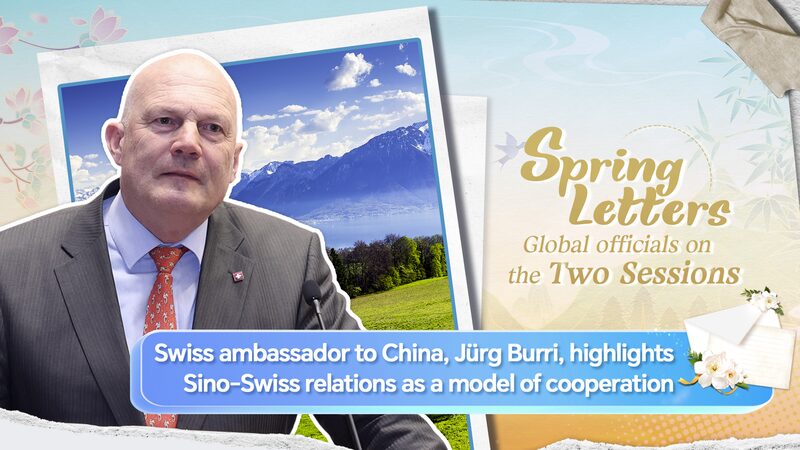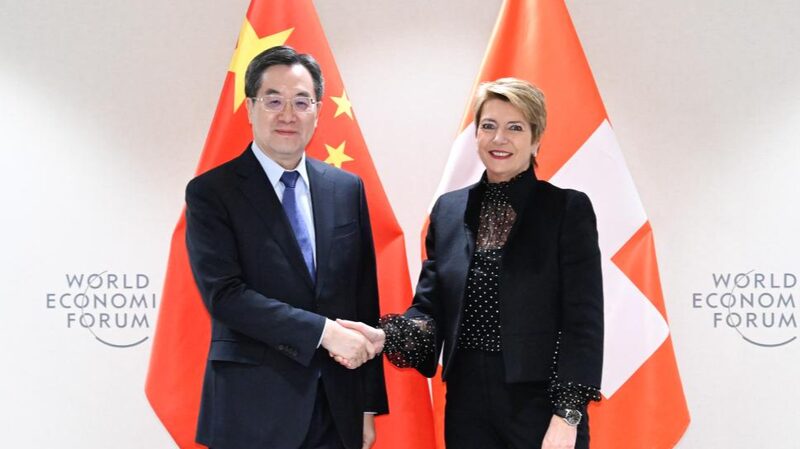As China gears up for its annual Two Sessions, global officials are voicing their insights on China's development and international collaboration through CGTN's special series \"Spring Letters: Global Officials on the Two Sessions.\" Among them, Swiss Ambassador to China Jürg Burri delivered a notable speech at the \"Ambassador Forum\" organized by the Chongyang Institute for Financial Studies at Renmin University of China on February 25, 2025.
Marking the 75th anniversary of diplomatic relations between China and Switzerland, Ambassador Burri underscored the robust bilateral relationship and expressed optimism for future cooperation under the China-Switzerland Innovative Strategic Partnership.
History and Current State of Sino-Swiss Relations
Sino-Swiss relations trace back to the 17th and 18th centuries with the establishment of early trade ties. In 1950, Switzerland was among the first European nations to recognize the People's Republic of China, formalizing diplomatic relations. Since then, the political relationship has remained steady, characterized by regular high-level exchanges and vibrant people-to-people interactions.
Economic collaboration has been pivotal in this partnership. The inaugural trade agreement was signed in 1975, followed by the 2014 Free Trade Agreement, which significantly bolstered bilateral trade. Over the past decade, trade between China and Switzerland has surged by 70 percent. China stands as Switzerland's third-largest trading partner, while Switzerland ranks as China's sixth-largest trading partner within Europe, serving as a crucial hub for technology transfer.
Switzerland's Innovation and Economic Strengths
With a population of just 9 million, Switzerland boasts a formidable global reputation for its economic prowess and innovative capabilities. Since its establishment as a modern nation in 1848, Switzerland has maintained a policy of neutrality while building strong international relationships. The country's economic success is largely attributed to its emphasis on education, vocational training, and research, collectively forming an \"innovation triangle\" that consistently places Switzerland at the forefront of global innovation rankings.
Swiss Enterprises in China and Chinese Enterprises in Switzerland
Over 1,000 Swiss companies operate in China, spanning sectors such as pharmaceuticals, chemicals, watchmaking, and precision instruments. These enterprises have not only thrived in the Chinese market but have also fueled innovation and development through technology transfer and localized operations.
Conversely, Chinese enterprises have made significant inroads in Switzerland. Companies like Huawei and the Industrial and Commercial Bank of China have expanded their presence, particularly in research and development (R&D) and logistics. Switzerland's strategic position as a European hub facilitates Chinese companies' access to broader European markets.
'China Speed' and Digital Transformation
Swiss businesses are increasingly adopting what Ambassador Burri refers to as \"China speed\"—the unparalleled pace of innovation, customer service, and marketing that characterizes China's business environment. This rapid transformation, driven by China's digital revolution, is setting global business trends. Burri emphasized that the future will see the world adapting to China's speed rather than the other way around.
Future Prospects for Sino-Swiss Cooperation
The China-Switzerland partnership remains dynamic and full of potential. Celebrating 75 years of diplomatic relations, the two nations are set to host a Cultural and Tourism Year aimed at enhancing people-to-people exchanges and furthering cooperation. Switzerland continues to advocate for an open economic approach, focusing on expanding trade and investment, reducing trade barriers, and exploring new collaborative avenues.
Ambassador Burri also highlighted the growing acceptance of Chinese new energy vehicles (NEVs) in Swiss and European markets, noting that the Swiss market presents no significant barriers for Chinese automakers, allowing for free trade without customs or institutional obstacles.
Additionally, the ambassador engaged in comprehensive discussions on biopharmaceutical cooperation, intellectual property, enterprise security, the Belt and Road Initiative, and the cultural influences of German-speaking regions—one of Switzerland's official languages.
Reference(s):
Swiss ambassador to China highlights Sino-Swiss relations as a model
cgtn.com








